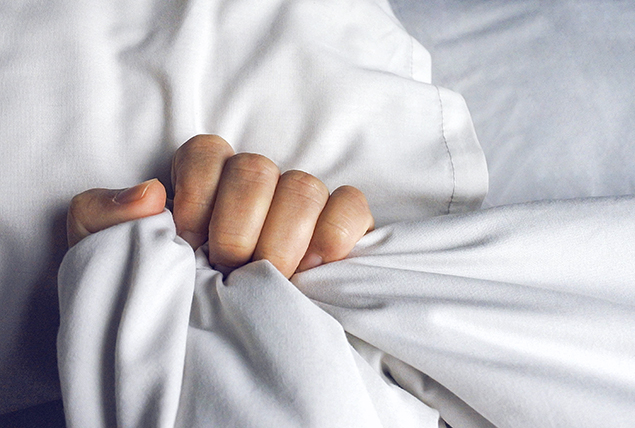What Is the Refractory Period and Why Do Men Have One?

There's a scene that references the male refractory period in film director Paul Thomas Anderson's love letter to the weird, wild world of '70s porn, "Boogie Nights."
In his first scene on camera, budding porn star Dirk Diggler (played by Mark Wahlberg) ejaculates too fast, and the camera doesn't catch the coveted "money shot." While the director and cinematographer argue over who's to blame and what's to be done, Diggler quietly speaks up: "Jack? I can do it again if you need a close-up."
The scene underscores a well-known but little-discussed truth about the male sexual apparatus: Most guys need some time after ejaculating before they can get hard and go again—fictional porn stars notwithstanding.
This is called the refractory period, and it's a bit of a mystery as to why it exists and why it's different for each guy.
What is the refractory period?
The refractory period is the duration of time a person needs between an orgasm and feeling sexually aroused again. We're focused on the male refractory period here. It should be noted, though, that women have a refractory period, too, though some do enjoy multiple orgasms and may not need nearly as long as men to recover.
According to the Masters and Johnson model of the sexual response cycle, sexual stimulation for both men and women follows this pattern:
- Excitement. The heart rate increases, breathing gets faster and blood begins to flow to the genitalia.
- Plateau. The muscles tense and the testicles pull up against the body or the clitoris retracts under the clitoral hood.
- Orgasm. The muscles contract and release tension, and the body gets flushed and red. In males, muscles throughout the pelvis contract to help push semen out of the body.
- Resolution. The muscles start to relax, the heart rate and blood pressure drop, and your response to sexual stimulation declines.
"The refractory period is the 'recovery' period after a person reaches climax, and a person is unable to climax again until this refractory period is over," said Amy Pearlman, M.D., the director of men's health at the Carver College of Medicine at University of Iowa Health Care. "It can be as short as a few minutes for some and last up to days for others."
Why do men have a refractory period though?
Not much is clear about the mechanics of the recovery process, apart from the fact that it is normal. The refractory period varies from individual to individual, too, and tends to get longer with age.
"We don't really know what the purpose of it is or why guys have a refractory period," said Neel Parekh, M.D., a male fertility specialist with Cleveland Clinic. "We don't know exactly how it works hormonally, but there are some theories that the hormone prolactin may play a role in determining a person's refractory period. The less prolactin that's produced may mean a shorter refractory period after ejaculation, but we really need more data and research."
Indeed, one trial studied a man who needed only two minutes between orgasms. He didn't secrete prolactin after he ejaculated, so it was postulated the two are connected. Interestingly, another study found his prolactin levels were 400 percent higher after intercourse than after masturbation, meaning the refractory period may last a lot longer after partnered sex.
Other theories suggest compounds called prostaglandins, which act as vasodilators and trigger inflammation, may affect the refractory period.
And it may be connected to the peripheral nervous system, as one 2013 study proposed. But as the researchers themselves noted, "direct empirical research supporting our approach is lacking," so cracking the secrets of the male refractory period isn't exactly a pressing issue for researchers.
Can you speed up your refractory period?
You can't exactly exert direct control over your refractory period, and as you age, you'll notice it takes longer to get aroused after an orgasm, just as it does before one. This doesn't necessarily represent a lack of interest in sex; it's a physiological matter.
However, there are some anecdotal tips that are thought to help:
- Reduce how often you ejaculate. If you're having sex every day, try holding off for an extra day or two and you may bounce back quicker for a repeat performance.
- Avoid alcohol before sex. Alcohol famously affects sexual activity and response and may contribute to delayed refractory periods.
- Introduce fantasy or roleplaying the second time around. A new fantasy vibe may help kick-start the engines.
Some men also report having a shorter refractory period when they use erectile dysfunction (ED) medications.
"I don't have many patients bring up [the refractory period], but the few I do have who mention it and use PDE5s have reported anecdotally that it takes a shorter amount of time," Parekh said.
Accepting the refractory period
The final boss is simply one that can't be beaten: Unless you're a guy like Dirk Diggler, your body simply needs time to recover post-orgasm. People need to accept the reality of certain anatomical choices nature has made for humans and make small changes to optimize the box they live in.
After all, the refractory period isn't something that has to ruin your sex life or your sexual function.
"There are some theories on what can affect [the refractory period], but the number one thing is your general overall health," Parekh said. "The more fit you are cardiovascularly and the less overweight [you are] tends to allow for a quicker turnaround time. The main thing is a healthy diet, exercise and that sort of stuff to improve your sexual health overall."


















